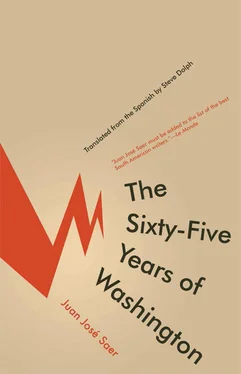Juan José Saer - The Sixty-Five Years of Washington
Здесь есть возможность читать онлайн «Juan José Saer - The Sixty-Five Years of Washington» весь текст электронной книги совершенно бесплатно (целиком полную версию без сокращений). В некоторых случаях можно слушать аудио, скачать через торрент в формате fb2 и присутствует краткое содержание. Год выпуска: 2010, Издательство: Open Letter, Жанр: Современная проза, на английском языке. Описание произведения, (предисловие) а так же отзывы посетителей доступны на портале библиотеки ЛибКат.
- Название:The Sixty-Five Years of Washington
- Автор:
- Издательство:Open Letter
- Жанр:
- Год:2010
- ISBN:нет данных
- Рейтинг книги:3 / 5. Голосов: 1
-
Избранное:Добавить в избранное
- Отзывы:
-
Ваша оценка:
- 60
- 1
- 2
- 3
- 4
- 5
The Sixty-Five Years of Washington: краткое содержание, описание и аннотация
Предлагаем к чтению аннотацию, описание, краткое содержание или предисловие (зависит от того, что написал сам автор книги «The Sixty-Five Years of Washington»). Если вы не нашли необходимую информацию о книге — напишите в комментариях, мы постараемся отыскать её.
The Sixty-Five Years of Washington — читать онлайн бесплатно полную книгу (весь текст) целиком
Ниже представлен текст книги, разбитый по страницам. Система сохранения места последней прочитанной страницы, позволяет с удобством читать онлайн бесплатно книгу «The Sixty-Five Years of Washington», без необходимости каждый раз заново искать на чём Вы остановились. Поставьте закладку, и сможете в любой момент перейти на страницу, на которой закончили чтение.
Интервал:
Закладка:
Leto looks back at the plaza. The white figure, at least a head taller than its interlocutor, speaks with distant and measured gestures, and as it forms part of a pleasant, blooming multitude, the plaza’s flowerbeds, the spring sun, the trees, and the blue sky, Leto thinks that it would definitely be nice to see the Mathematician again and have a conversation, less because of the Mathematician himself than because of the whole morning he is part of and because he is now a part of his life, but actually, in the coming years, they will only be together two or three times at parties where they exchange a few words and, when they meet on the street, will limit themselves to a greeting, polite of course, but without stopping to talk — and all of these encounters more and more sporadic and further and further apart. Little by little Leto will abandon his work, more and more involved in political militancy, with more and more radicalized groups, until eventually going into hiding, and not a trace will remain of the familiar Leto but for two or three brief reappearances, except with a few close friends like Tomatis, Barco, El Gato Garay, who he will visit every so often, always briefly and unexpectedly, not to discuss politics but to spend some time with people who are connected to him not just by principles, but rather, to say it again, by shared experiences and memories, since it’s possible to fight against the same oppression, with the same principles even, but for different reasons. First he will leave his job — Isabel ends up marrying Lopecito — then his house, then the city, later the country, coming and going from Europe to Cuba, to the Middle East, to Africa, to Vietnam, until he disappears completely into the exacting, silent, clandestine life of the walking dead. For sixteen or seventeen years he will sink into an order governed by such strict, specialized, closed-circuit norms that, although they were created to form an association of people who intended to modify reality, will force him into an unreality so profound that, behind his so-called impenetrable mask, into which his face will be transformed, or inside the various costumes he will dress up in to enter and exit the same comedy like an actor playing several supporting roles at once, in his own life, behind the impenetrable mask — we were saying, or rather yours truly, just now, was saying, no? — nothing will be left after the rage, the faith, the daring, but a sardonic and not even self-pitying intransigence of someone who, chased by a torrential storm, as they say, or by an uninterrupted series of explosions, runs in a straight line, without caring, and maybe without even asking, whether the direction they are running in will lead them to safety or to a precipice. In any case, at some point he will start carrying, wherever he goes, a suicide pill, well-hidden against his body in one of his pockets, and every so often he will look at it to remind himself, not of his mortality, but of his freedom. Guessing the weight of things, he will tell himself with cold satisfaction that, placed on the opposite side of a scale as the little pill encased in plastic, the entire universe would weigh nothing, and that the little pill could dispatch the immeasurable weight of the known world and make it disappear suddenly and silently in spite of its iridescent, soap bubble feel. But all of this will come little by little, after successive stages of uncertainty, violence, and deception. At some point, in the last two or three years, he won’t have anything left but the silence, the sardonic intransigence, and the pill. After confirming that the whole universe is inconsistent and futile, the pill, in its place, will become a singular object. And having realized after fifteen years that blind fighting against oppression can create more oppression rather than eliminating it, the way sometimes fighting a fire can actually increases the force of the flames, and having come too far to turn back, he will begin to trust, not in strategies or organizations or in so-called historical movements, not even in his own weapon, but only in the pill, in his pill, the way someone might refer, as they say, to his sixth sense or his lucky star. The way others think of their bank account as a provision against hardship, he will think of his pill. After a few years his physical appearance will change drastically. The messy hair on his head will thin and gray, making his forehead much larger, exposing the wrinkles. He will start wearing contact lenses in order to get rid of the glasses, and he’ll grow a thin, silky beard, grayish, curly, and straightening out around the corners of his mouth, and in spite of his thin, almost frail shoulders and slightly crooked legs, a kind of taut thickness will build up at his abdomen, maybe because, having decided not to drink anymore so as not to lose his clarity or his reflexes, he will suffer, looking for a substitute, from a weakness, as they say, for soft drinks, cakes, ice cream, chocolate, and caramels. The change will be so drastic that after not having seen him for a few years, Barco, who he will go to early one day for the key to Tomatis’s apartment — he was traveling in Europe at the time — Barco, we were, or rather, I — yours truly — was saying, seeing him appear between sheets of gray morning rain, won’t recognize him for several minutes, until hearing him recall — his voice somewhat cracked by the cigarettes that in those days he lit with the one he’d just finished — their shared experiences. In fact, the sacrosanct pill will be given to him as yet another obligation, wrapped up with indoctrinatory discourse where the words sacrifice, cause, victory , and republic would easily stand out in any lexical frequency analysis, but he, secretly even to himself at first, will receive it as a promise, a privilege, an amulet. Later he will start to roll it over his tongue, not as a test of his invisibility to his enemies, but as a means of ridicule and contempt, behind his impassive face, toward his own allies. If by chance he finds himself yet again at a meeting where he doesn’t agree with a single decision, he will catch himself thinking, slightly annoyed, sardonic: Talk all you want, I have my pill . It will be like his own portable nuclear bomb, his perfect weapon. At several dangerous moments, after realizing that they had been false alarms, he will notice that while his comrades had instinctively drawn their weapons, he had first reached for the pill and then, several seconds later, for his gun. He will learn to keep space, time, history, and matter itself at bay and as though in suspense with the pill. No one likes going from subject to object , he will tell himself more than once, laughing a little deep down because to the outside world he will be always impassive, so much so that his equals — after so many years of risk and violence he will have reached the rank of Comandante — his immediate superiors, mistrusted him, not having learned how to match, every day, his discipline and indifference to danger. No one likes going from subject to object , he will say, we were saying — or rather, no? — yours truly was, as I was saying. No one likes going from subject to object, but with the pill, eh? With the pill what’s lost in the transfer is still up for discussion . He won’t be far from thinking that just like the big bang was the start of existence, the almost inaudible click of his jaw closing and his upper teeth colliding with his lower teeth to crush the pill will end it once and for all. A few months before this click, he will visit Tomatis at his mother’s house, where Tomatis has taken refuge after his third divorce. At the time Tomatis will be suffering from what people called psychiatrists call depression, which he will come out of intact a few months later, but when Leto visits he will be at what those same people call a critical juncture. Tomatis will spend every day being waited on by his sister — thrilled despite everything to have him home — while sitting in a chair in the living room watching television from noon until 2:00 or 3:00 in the morning, with a demijohn of Caroya wine on the floor next to the chair, and a glass, a plastic ice dish shaped like an apple with white bumps, and a stem-shaped corkscrew on the table. From the bedroom, his mother, blind and slightly senile, because she never gets up from bed, calls out to him every so often to often to give him a kiss, calls him baby, like when he was little, and whimpers a little. It will be midsummer. Since just before Christmas, Tomatis will have installed himself in the house, sleeping, by means of a meticulous ingestion of barbiturates and tranquilizers, in the room on the terrace, which his sister had to clean out because it had been turned into storage. Every morning, when the electric shadows, the garish simulacra, the bimbos, and miniaturized Barbies of cookie-cutter American shows, interrupted every five minutes by the commercials thought up by and for the retarded, the military propaganda inviting the unemployed youth to join gangs of murderers and torturers in order to save the nation from the cancer of deviance — every morning, no? — in the burning darkness filthy with the pestilence, you could say, of unmarked graves and decay, Tomatis will get up, breathless and somewhat brutalized by the Caroya wine, the barbiturates, and the tranquilizers, just to collapse on the same couch where, twenty years earlier, he had spent every night contemplating, joyfully, delighted, the carnal and the divine. Without recovering completely, he will wake up every morning around noon, and after drinking a couple of mates in the shade of the terrace, will sit down again, with a plate of cold cuts and tomatoes, the demijohn, and the ice dish, in front of the television, getting up every once in a while to take a piss or to get an irresolute kiss from his mother, who will call him baby again like when he was little and pat him on the wrinkled cheek that’s covered with a hard, two- or three-day-old gray-streaked beard. The colored shadows will march across his inexpressive eyes, which will sometimes half close trying to understand the insipid jokes of the third-rate comedians, almost inaudible over the canned laughter and applause. Moving the chair between two open doors in order to take advantage of a nonexistent breeze, wearing only underwear and a pair of hemp flip-flops, from noon until 2:00 or 3:00 in the morning he will watch the cycle — sometimes losing the story lines and sometimes without even looking at the screen — of infomercials, educational shows, police dramas, or westerns, the kids shows, the soap operas, the folk stories, the shows written for housekeepers, picking his nose every so often, rolling a soft, dark ball with his snot and dropping it next to the chair. Once in a while he will have a jolt of rebellion: What if I shove it in your mouth , he will mutter to the host of a kids show who insists on speaking in the high-pitched, infantile voice people assume you should use with children. If I shove it in your mouth, we’ll see how fast you lose the baby voice . And once in a while, to the government propaganda, out loud, but with a diluted hatred, sitting up a little and grabbing his flaccid bundle of genitals: This, right here . But deflating again, he will look toward the kitchen, afraid that his sister, convinced that he’s having the most relaxing vacation in years, will be offended by the vulgar remark.
Читать дальшеИнтервал:
Закладка:
Похожие книги на «The Sixty-Five Years of Washington»
Представляем Вашему вниманию похожие книги на «The Sixty-Five Years of Washington» списком для выбора. Мы отобрали схожую по названию и смыслу литературу в надежде предоставить читателям больше вариантов отыскать новые, интересные, ещё непрочитанные произведения.
Обсуждение, отзывы о книге «The Sixty-Five Years of Washington» и просто собственные мнения читателей. Оставьте ваши комментарии, напишите, что Вы думаете о произведении, его смысле или главных героях. Укажите что конкретно понравилось, а что нет, и почему Вы так считаете.












